True Grit in the Face of a Pandemic
Three Rural Hospitals, One COVID-19 Story
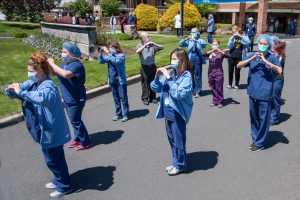
I interviewed three hospital CEOs in mid-June and followed up with them in early July. My goal was to identify the strengths they possess, and the lessons they’ve learned, that will see them through the pandemic and contribute to their future success. To set the tone, here are three quotes that stand out:
“A tsunami was coming, there was nothing we could do to avoid it.”
– Jeff Turner, CEO, Moore County Hospital District, Dumas TX
“We learned that when you communicate, prepare, plan and innovate, you can do almost anything.”
-Leslie Marsh, CEO, Lexington Regional Health Center, Lexington NB
“In order for us to survive – there is no way we can do it independently -we have to work together.”
-Angela Ammons, CEO, Clinch Memorial Hospital, Homerville, GA
Common Themes Emerge
I marveled at her optimism when Angela Ammons said, “There is enough wrong that we will never run out of opportunities to work together.” She, like every other rural and community hospital CEO across the nation, has been leading her hospital through the exceptional and historically difficult COVID-19 crisis.
None of them had seen anything like it before.
And yet, Angela, like the others, was already looking forward to the next challenge, and the next one after that.
Each spring, the town of Homerville, in Clinch County, Georgia, sees a large influx of migrant farm workers. While the actual number of covid cases Clinch County Hospital has been treating is comparatively small, the real challenge lies been beyond its walls.
In Lexington, Nebraska, the covid case load came on suddenly and persisted for weeks. And, just like his fellow CEOs, Leslie Marsh was able to make the most of the strong community relationships Lexington Regional Health Center has invested in for years.
And, while Moore County in Texas initially had the highest per capita infection rate in the state, CEO Jeff Turner was able to go beyond the walls of his hospital to prevent the covid “tsunami” from wiping out hundreds, perhaps thousands of additional lives.
The Clinch County Story
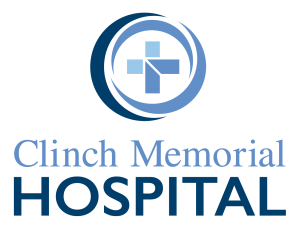
Even before the COVID crisis, Clinch Memorial in Georgia had garnered national attention and inspired healthcare and community leaders alike. Angela was appointed CEO in September of 2017 and has since completely transformed its reputation, professional team and financial condition.
“When I started, we had 3-days cash on hand, now we have 6-months,” she said. When I asked what made it possible, she said, “We had to go through a complete culture change.”
Knowing she couldn’t go it alone, Angela began building connections with other hospital CEOs. “My first day on the job, I did some research and decided to ask Robin Rau to be my mentor.” Robin is the CEO at nearby Miller County Hospital. “With her, a door of connections was open.”
From the outset, Angela focused on gaining the community’s trust. “When a man said he wouldn’t bring his least favorite dog to Clinch Memorial, I knew we had to work on our reputation.” Since then, Clinch has been recognized as one of the top hospitals in the state. Building close relationships with local industry was also an early objective.
They say timing is everything, and for Clinch Memorial, the previous two years of rejuvenation, growth, outreach and collaboration meant the hospital was able to prepare for, and respond to, the demands placed on it by the pandemic.
Internally, it started with learning from others and setting up procedures and facilities to protect employees. As of the end of June, only one Clinch employee had tested positive. “We learned from the mistakes of others,” Angela said. “Our team is a group of fighters and we adjust to whatever comes our way.”
And come their way it did. Largely because of the difficulty in communicating with and managing the healthcare and medical needs of migrant workers and, before massive layoffs, there was an alarming spike in cases.
“We had workers sneaking away to get health services and tests using false names, numbers, addresses. We had no way of getting back in touch with them… no way to know how many were sick.” Rather than stay behind the relatively safe walls of their hospital, Angela and her team went into the migrant communities to offer free testing.
When local food producers experienced a severe loss of buyers, the good connections forged by Angela paid off. A rural hospital vegetable collective was created and now produce is being supplied directly to Clinch Memorial and Miller County Hospital. The hospitals save money and the producers have somewhere to sell their produce.
In the face of all the challenges, Angela’s hospital continues to gain the respect, trust and support of the community. In mid-July, she said, “I think the community now has a new perspective on Clinch Memorial Hospital. During the pandemic, we have served as a hub of COVID-19 testing, care, and information. I believe the pandemic has caused the community to build greater trust in their local hospital because we have provided services and information they have relied upon.”
Lexington Regional: Innovation Perseveres
“We were a hot spot,” Leslie Marsh, CEO of Lexington Regional Health Center in Dawson County Nebraska said in Mid-June. “But, when our first two COVID patients showed up on April 11th, we were already prepared.”
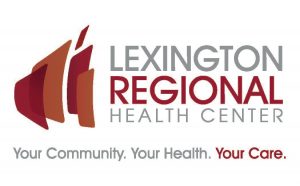
Leslie said they relied on two essential strengths to meet this huge, unprecedented challenge, “Adaptive management is critical. We need to adapt quickly and for sustained periods… which means resilience is also key.”
The willingness to embrace change and a deep reservoir of true grit has been essential throughout the pandemic as the hospital, especially early on when Dawson County saw an initial surge of 650 cases.
At first, it was thought there were two sources of the surge. One of them, a meat packing plant, was an easy target because of the tragic, well-publicized experiences in similar facilities elsewhere in the country. In Dawson County however, the packing plant had already been working with Leslie’s team and in preparing for what was coming, spent hundreds of thousands of dollars to implement safety procedures and physical barriers to protect its workers.
“Because we have such a great partnership with the plant, and they are super innovative, their actions were not only impressive, but highly effective,” Leslie said. Despite that, she says, “There was a misconception that the positive cases were all from the plant.”
Like Angela’s experience at Clinch Memorial with migrant farm workers, one of the causes of the Dawson surge has its roots in a challenge many rural and community hospital leaders contend with. “Our area as a whole is socio-economically depressed,” Leslie said. “About 15% of the workers in the plant are Somalian refugees and another 65% are Latino.”
When it comes to understanding their role in preventing the spread of something like COVID-19, there are natural cultural barriers to overcome. Family events like celebrating Easter, Cinco de Mayo, or holding Quinceañera parties, play a major role in family and community life. But, in the teeth of a pandemic, they are deadly.
For Leslie, the challenge lies in how her’s and other hospitals, deploy community health workers. “We need to get out there in advance, we need to create understanding in the community, and we need to do it in a balanced way.”
Moore County: Collaboration Conquers
“Initially we had a lot of really sick people… it was all we did, all we spoke about and worked. It was all COVID all the time for eight weeks,” Jeff Turner, CEO of Moore County Hospital Group in Texas said.
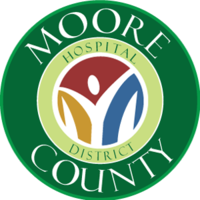
When it began, Moore County had highest per capita COVID rate in Texas. But, before that, Jeff was watching closely what was happening in Italy, New York City and Pennsylvania. “I couldn’t believe it; here I am a CEO and I have a global pandemic coming my way… a tsunami was coming, there was nothing we could do to avoid it,” he said. “I thought, ‘Well, we don’t live like they do in Italy, we don’t have people stacked on top of each other in apartment buildings like New York… but there are some similarities here.’”
The telling answers came when he saw that the most important similarity in these other places that related to Moore County was people working and living closely together.
Like Lexington County, a large meat packing plant near Jeff’s hospital was able to save lives thanks to its partnership with Moore County. In mid-2019, Jeff and the senior management of the plant worked out an arrangement – a direct contract of sorts – in which the hospital became the primary and preferred source of employee healthcare.
Before COVID-19 gained momentum in the area, the national president of the company that owned the plant called Jeff directly. He asked Jeff for his opinion on what was likely to come. “I said, ‘It’s going to heat up,’” Jeff told me. After giving Jeff a full briefing on what was already being done inside the plant, the president asked if there was anything else they could do to protect their employees.
“I was blown away… the top guy in the country was asking for help and cared so much about his people,” Jeff said. “This wouldn’t have happened without the relationship we’ve formed over the past year and more. The employer did an outstanding job of putting in mitigating strategies and managing employees. Our partnership absolutely saved lives.”
Jeff also reached out to his nursing home administrator. “I said, ‘I think this COVID thing is real and we are potentially a higher risk than normal community… so what do you think about locking the nursing home down?’” The administrator agreed and immediate action was taken.
When his chief medical officer took action on his own by asking each doctor to report on key areas of information the hospital would need to manage the crisis, Jeff said his reaction was to think, “I’m living the dream. They had already mobilized and categorized work and assigned subject matter experts so we had everything we needed to address the crisis. I knew our doctors would be capable of cutting edge care delivery.”
In the COVID crisis, taking a predictive approach to assessing the future, both opportunities and dangers, as well as, being able to rely on the trust of others to create effective collaborative initiatives, helped save lives in Moore County.
The Future: Rural Can Be Stronger Than Ever
During my conversations with all three of these CEOs, I asked what they think the future holds for rural and community hospitals after the COVID crisis is behind us.
Jeff Turner said he believes rural hospitals have an advantage because of their ability to create and continuously strengthen their ties to the communities they serve.
“Rural health care is vital to the health of our nation. Our ability to treat patients like family and neighbors is where rural markets can excel… much more than an urban hospital. How many of those big systems were calling every positive patient every day? The answer is probably zero. We did it every single day. Our patients should expect world class, or better, results because we have the time and caring to do it.”
Leslie Marsh said the greatest pitfall is working in isolation within your hospital and within your community. “We are doing the right thing. Our people care and our patients respond in ways that are humbling. You need to get your team together and talk things through. They are talented and bright so when you encourage participation and conversation, you are going to do just fine. They know what to do.”
Another stand out realization for Leslie is how important it is for hospital leaders and their teams to embrace change. He said, “It’s OK if things are not the same. Change is hard, but we had so much change, sustained change, we really learned that it’s OK if things are not the same.”
Returning to the beginning of this article, I want to give the last word to Angela Ammons who said, “In order for us to survive – there is no way we can do it independently – we have to work together. There is enough wrong that we will never run out of opportunities to work together.”
And, according to Angela, here’s the essence of rural success, “People want to help, all you need to do is ask for help.”

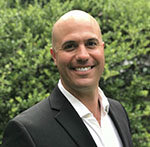
Our newest team member, Michael J. Patti, joined HealthSure in July as a Risk Advisor.
His broad education, leadership and advisory experience will be an asset as he focuses on helping rural and community hospitals navigate and succeed in the complex world of risk and insurance.
His education in political science, Spanish and business administration coupled with career experience helping HR professionals in large public entities, as well as running for state senate, is a solid foundation for growing with HealthSure.
Michael graduated from Arizona State University in Political Science and Spanish. He then received his MBA from Acton School of Business in Austin. He has taught high school Spanish, coached basketball and track and field, and has progressively excelled in business development positions.
His greatest desire is to live a life filled with purpose and he says, “What better way than to help rural hospitals serve their employees so they in turn can protect and nurture the health of the communities we all serve.”

DOL Releases More Q&As on Workplace Laws and Coronavirus
| On July 20, 2020, the U.S. Department of Labor (DOL) announced the agency’s publication of additional guidance on applying federal employment laws in the context of the COVID-19 pandemic. The guidance is in the form of questions and answers added to sets of Q&As the agency issued earlier in the year about the operation of the federal Family and Medical Leave Act (FMLA), the Fair Labor Standards Act (FLSA) and the Families First Coronavirus Response Act (FFCRA) in workplace situations involving COVID-19. FLSA FAQs The DOL’s new guidance on COVID-19 and the FLSA addresses topics such as teleworking and compensable time, maintaining employees’ exempt and non-exempt status, and hazard pay. FMLA FAQs In addition to substituting “COVID-19” for “influenza” in many places, the new guidance on COVID-19 and the FMLA adds questions on whether a telemedicine appointment can establish a serious medical condition under the statute (yes, if the appointment meets certain requirements), and whether the FMLA prohibits employers from requiring a COVID-19 test of employees returning from FMLA leave (no, where the testing requirement is unrelated to FMLA leave and applies to all employees). Employers should be aware that while the DOL’s Q&As on the FMLA continue to assert that there is no paid employee leave requirement under federal law, the FFCRA does require paid leave for specified COVID-19-related reasons. FCRA FAQs Issues addressed by the DOL’s additional Q&As on the FFCRA include requiring employees returning from FFCRA leave to be tested for COVID-19 and the availability of FFCRA leave after a furlough. |
|

Cyber War Survivors Tell Their Tale
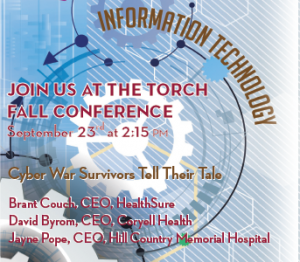
Information Technology Session
TORCH FALL CONFERENCE
September 23rd
2:15 PM
Gone To Texas Room
Information Technology Session
Moderator: Brant Couch, CEO, HealthSure, Austin, TX
- Speakers: David Byrom, CEO, Coryell Health, Gatesville, TX
- Jayne Pope, CEO, Hill Country Memorial Hospital, Fredericksburg, TX
As the number of hospital cyber breaches and digital fraud instances continue to escalate, it’s beginning to feel like we’re at war.
The casualties are nothing less than staggering; disrupted patient care, wounded operations, damaged financials, and tarnished
reputations litter the healthcare landscape. This is your opportunity to learn from two hospital CEOs who have personally battled
cyber criminals. From mistakes made, to crisis management, to the resulting experience-based best practices, this breakout session is
ideal for hospital leaders who need to know what to do when they find themselves on the front lines of the cyber war.
Learning Objectives
- Practical approaches you can use to prevent cyber breaches and cyber fraud
- A better understanding of the cyber risks insurance policies cover and don’t cover
- A take-away prevention and protection battle plan that can adapt to any budget



